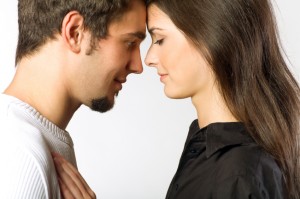What it Means to Be Loving
 While many of us may have sensed it intuitively, there is now science behind the statement that “love is all you need.” A 75-year longitudinal study by Harvard researchers recently revealed that love itself is the one true key to a happy and fulfilling life.
While many of us may have sensed it intuitively, there is now science behind the statement that “love is all you need.” A 75-year longitudinal study by Harvard researchers recently revealed that love itself is the one true key to a happy and fulfilling life.
While love seems to be a universally valued attribute, defining love in behavioral terms can be a challenging undertaking. As the Harvard study’s lead researcher, Dr. George Vaillant, wrote of his team’s findings, there are two essential ingredients proven to correlate with a happy existence: “One is love. The other is finding a way of coping with life that does not push love away.” While many of us believe we would like to be in love, we face many hurdles in taking the actions that allow love to flow freely throughout our lives and relationships. We have many ways of defending ourselves against love, and struggle to give and receive love with ease, openness and vulnerability.
With love being so closely connected to meaning and fulfillment, it’s valuable for each of us to define love as a verb, an action or series of actions we can take to bring us closer to the people we value. In a romantic context, some essential characteristics that fit the description of a loving relationship include:
- Expressions of affection, both physical and emotional
- A wish to offer pleasure and satisfaction to another
- Tenderness, compassion and sensitivity to the needs of the other
- A desire for shared activities and pursuits
- An appropriate level of sharing of one’s possessions
- An ongoing, honest exchange of personal feelings
- The process of offering concern, comfort and outward assistance for the loved one’s aspirations
Love includes feeling for the other that goes beyond any selfishness or self-interest on the part of the loved one. As such, love nurtures and has a positive effect on each person’s self-esteem and sense of well-being. Love is being truthful and never involves deception, because misleading another person fractures his or her sense of reality and is, therefore, an actual human rights violation that adversely affects mental health.
So how well do we meet these standards for being loving? When we think about a relationship that is meaningful to us, we have to ask: Do we both behave in ways that nurture each other? Do we take actions to make the other person feel good? Do we consider what lights the person up, separate from our own interests?
Too often, we think of love as an almost passive state of being, as opposed to a conscious choice we make. When we regard love as something we fall into, we can easily slip into routines with the person we value or lose a sense of separateness and respect. Instead, we view that person as a part of us. We then run the risk of creating a “Fantasy Bond,” an illusion of fusion in which real feelings of fondness and attraction are replaced by the form of being in a relationship. In other words, we come to see ourselves and our partner as a single unit. We then fall into roles rather than appreciating each other as individuals and experiencing the exciting, loving feelings that result.
Even though a Fantasy Bond replaces real relating with another person, it offers a false sense of security, the illusion that we are no longer alone. However, when we connect to someone in this way, we lose our sense of vitality, and we give up significant aspects of our relationship. The behavioral operations of love are replaced with a fantasy of being in love, which does not nurture either partner.
Relationships tend to go south when we stop taking actions that our partner would perceive as loving, and instead, start looking to our partner solely to meet our own needs. It’s important to distinguish emotional hunger from real love. For example, have you ever witnessed a parent hugging a child and wondered whether the hug was intended to comfort the child, offering reassurance and care, or to soothe the parent, taking something from the child? When we are reaching out to our partner, it can be valuable to examine whether our behaviors are for them or for ourselves. Are we looking to them to fulfill us in some way that is unfair to them? Are we hoping they will make up for an emptiness or hurt from our past?
A couple I’ve worked with recently recognized an example of this dynamic. The wife would often compliment her husband, but he rarely felt acknowledged by her words. When she recounted some of the recent comments she made, she noticed that they were less of a reflection of him and more a reflection on her. Statements like, “Aren’t I married to such a handsome, well-put-together man?” Or, “Haven’t I picked a winner?” didn’t capture qualities that were important to him. Rather, they were traits she valued in a partner that reconfirmed her own self-esteem and sense of worth.
Love should never be an act of manipulation. It is not a mark of ownership over another person, but rather the exact opposite: a genuine appreciation of a person as a separate individual. When we see a person this way, we allow ourselves to fully value them for who they are and for the happiness they bring to our lives. We are driven to be generous toward this person, to show compassion and kindness in a way that both they and the outside world would view as loving.
Of course, there are many barriers we put in place that not only keep us from finding this type of relationship but from achieving it with the person we love. One of the reasons we wind up in less-than-loving relationships is due to ways we were treated in our past. We may have become familiar with family dynamics in which we were rejected or intruded on, in which case we tend to seek out or recreate these same dynamics in our adult relationships. To become more loving thus means recognizing ways we self-sabotage. How are we recreating past hurts in our current relationships?
As we reflect on these behaviors, we learn a lot, not only about how we interfere with our naturally loving feelings for others but about the negative ways we feel about ourselves. It’s difficult to express love outwardly when we don’t feel our own sense of self-worth. One of the biggest reasons we shut out love is because we feel unworthy or self-denying. Therefore, to have a loving relationship, we must challenge our negative self-concept, or our “critical inner voice.” When we do this and take the loving actions that contradict our critical self-image, we enhance our own sense of worth and are able to get closer to the people we love.
Tags: fantasty bond, how to fix a relationship, improve your relationship, lasting love, learn to love, love, real love7 Comments
Leave a Reply
You must be logged in to post a comment.










A therapist I once worked with during a seminar told me that I had a “great capacity for love”. I’ve heard those exact words from several pshycology/analysis/therapy professionals, but they never made any sense. I don’t see me as a bank of loving-feeling-slosh. You either are, or aren’t. Like with all other qualities, positive or negative. You either are, or aren’t an honest person, or a person with integrity, or a liar, or a cheater, or a thief. After a couple of decades of being a person with that great love bank, that just resulted in me being a love bank and others being vampires, including partners and friends, I’ve just come to the conclusion that love is only what the mother feels for her child. Unconditional, unstoppable, uncontrolled. Everything else is a quid-pro-quo and we should control and be wary of it as much as we can. Your ideas are pretty, but they are utopian. People are never so well-rounded to project unblemished feelings and behaviours between one another. As you said in the other article, we all carry our bagagge, and each of us have to juggle with ours and the other person’s hot-plates if we’re to have hopes of succeeding in some sort of mutual … relationship. I’ve been accussed of “burdening” other people with my baggage all too often, while in fact, I hardlly ever discuss the serious issues… I won’t be the ball-an-chain anymore. It’d be nice if your utopia was real, but from my experience it never is. All this relationship lark is a powergame that I don’t understand and I don’t want to be part of anymore. Very beautiful feelings conveyed by the article though, wish they were true.
I agree.
Everyone is built to love. It is your choice. You either decide to come from a loving place or not. One feels beautiful one does not. This includes loving you in this picture.
I think your therapist was telling you you have a capacity to love but you are guarded and don’t allow it flow through you. It’s a choice. A practice. You get to decide. Isn’t that great?
I have been in therapy for near on a decade struggling with my fear of intimacy dynamic. I am finally seeing the payoff and am now in what I consider to be the most loving of relationships I have experienced! The last two paragraphs really resonated.
“As we reflect on these behaviors, we learn a lot, not only about how we interfere with our naturally loving feelings for others but about the negative ways we feel about ourselves. It’s difficult to express love outwardly when we don’t feel our own sense of self-worth. One of the biggest reasons we shut out love is because we feel unworthy or self-denying.”
The work I am doing now which I’m finding helpful in unravelling my ‘unworthiness’ is the e-course crafted by Oprah and Dr Brene Brown (shame and vulnerability researcher who went viral on TED talks). Hang in there .. been there (the black hole of intimacy phobia) and am seeing the light at the end of the tunnel. I wish you well on your journey to worthiness and lovability. : )
It’s 4 am, I’m reading this fascinating blog, trying to work out if the man that recently abandoned me was the narcissistic type, if I’m the “afraid to love type”…. The answer is yes and no. As the first respondent says, life is not a beautiful utopia. And the examples offered here don’t match a real person to a point of exactness either. But this articles help me look at things I was not conscious of before, they offer very helpful hints of what to look for when I don’t understand what is happening. To me love is about making an effort, and about learning. And ok, he broke my heart, and I made some mistakes along the way. But I will not give up on it. Real love, good love, is nurturing and having lost it has taught me a few things about myself, this adventure is never a wasted effort, even if I’ve spent the past five months crying inconsolably. It always takes two to tango, even if the other person appears as the “perpetrator” why did we open ourselves to that dynamic? What is behind that? In the film “as good as it gets” Jack Nicholson says to Helen Hunt “you make me want to be a better person” this is what I hope to find one day, because I know it exists. So the search continues, and on the next round, I’ve learnt that I should not be so full of doubt, and just go for it with more certainty, even if I can’t be certain of the outcome. Life is no utopia, but is so much more interesting that way. Thanks for writing this blog, it helps people. Good luck.
The most beautiful experience in life is the exchange of loving feelings between another person who reflects back the same degree of unconditional acceptance, appreciation and love. Making love with the eyes allows an interchange of blissful energy that heals a sense of being alone and isolated, restoring a liberating sense of connection and vitality. Most of us feel unworthy of deep love and fear both its expression and reception; however, we tend to love and trust those who have the courage to remove the barriers to their heart and be vulnerable and open. It takes great courage to reveal your naked heart, and mourning a loss is far healthier than carrying anger and resentment into your next relationship. Tears release the pain behind the rage that is a screen for prior wounds that need to be addressed. Sitting with the sexual tension allows you to realise that it is a desire to love and be loved, and not sexual gratification, that is the driving force behind attraction. Any man who is vulnerable enough to share his loving feelings with me retains a special place inside my heart. I love a man with soul more than a guy with a fancy car or big job title. Real men are vulnerable. Mature people feel deeply and genuinely.
love for me was always “You, Me, We and respecting them as three different entities”.. am glad that his article also touches on how important individuality is in a relationship .. but for me, my individuality is something that is hurting my relation. He always tells me ‘You should’ve never been in a relationship’ or ‘you are tooo individualistic ..’ I tend to be rude I admit but I feel I have been there in his worst and best times in all sincerity.
and the one thing that is troubling me is .. i feel he brings out the worst in me and i am finding it terribly hard to reconcile with that feeling.. i think i have given enough chances and cant be living with this feeling.. the article is good but I think as the first responder, it’s a little utopian..